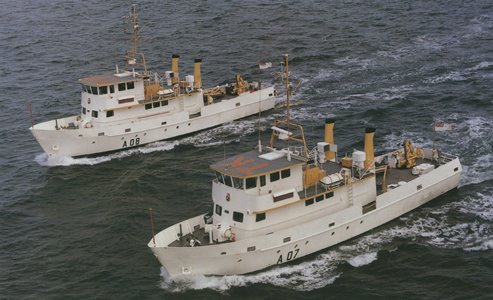The Nigerian Navy (NN) has acquired more than 300 inshore patrol crafts, to combat maritime crimes in the Country.
The Navy said it also arrested 206 vessels and barges as well as hundreds of suspects for various maritime offences in the last 4 years.
The Chief of Naval Staff (CNS), Vice Adm. Ibok-Ete Ibas, disclosed this at the opening ceremony of the Global Conference on Maritime Security on Monday in Abuja.
The conference seeks to explore options for improved security and maritime governance within the Nigerian Waters and the Gulf of Guninea.
The naval chief said the theme of the conference “Enhancing Maritime Security in the Gulf of Guinea: Together We Win ” was very timely and relevant.
Ibas said Nigerian Navy equally acquired offshore patrol vessels, fast attack craft,logistics vessels, hydrographic ship and more than 300 inshore patrol crafts.
“Internally, drawing from its Total Spectrum Maritime Strategy, the Nigerian Navy has sustained the operational concept of Maritime Trinity of Action comprising surveillance capabilities, response initiatives and law enforcement to combat maritime crimes.”
Ibas said consistent funding over the past 4 years had impacted positively on Navy’s surveillance and maritime domain awareness infrastructure.
“The Nigerian Navy has acquired offshore patrol vessels, fast attack craft,logistics vessels, hydrographic ship and more than 300 inshore patrol crafts.
“Concurrent effort has been made to encourage operational training and indigenous shipbuilding capacity.
“Naval security stations have also been established at strategic locations along the coast as part of a “Choke Point Concept’ to checkmate illicit activities.
“Additionally, to enhance maritime law administration, the Navy in conjunction with maritime law enforcement agencies has also articulated a harmonized procedure to enhance the synergy among stakeholders in the arrest and prosecution of maritime offenders.”
He said the totality of these efforts has increased regional collaboration, resulting in more vectored patrols and increased efficiency in naval operations.
Ibas said the Nigerian Navy intends to consolidate current collaborative efforts, sustain fleet renewal and expand its maritime awareness infrastructure.
“It is pertinent to state that there remains a huge gap in the capacity of navies/coast guards of the region to address the prevailing threats.
“These gaps are largely due to inadequate political will by governments of the Gulf of Guinea (GOG) States to adequately resource their navies/coastguard for effective maritime security.
“I am optimistic that this conference will provide fresh opportunity for member States and our partners to reinforce our resolve to speedily operationalise maritime security initiatives.
“This would bolster the capacity of regional navies to effectively meet the demands of ensuring a safer and more secure maritime domain,” he said.
Speaking, the Minister of Defence,Maj.-Gen Bashir Magashi, (Rtd), said African maritime domain remains strategic and extremely crucial to the development of the nations.
Magashi, who was represented by the Permanent Secretary, ministry of Defence, Mrs Nuratu Batagarawa, said Africa usage of the sea was still spoken in potential terms.
“Unfortunately Africa’s usage of the seas is still largely spoken of in potential terms, reflecting poorly the impressive progress of other sections of the world.
“The vast expanse of its waters, infamously typified by the unsavory reputation of its key region, the Gulf of Guinea (GOG) is persistently challenged by a myriads of threats,
“Some of the threats impinging on the regional security are piracy/sea robbery, drug and human trafficking as well as the worrisome pipeline vandalism and crude oil theft.
“Others are illegal, unreported and unregulated (IUU) fishing, proliferation of small arms and light weapons, terrorism and environmental degradation.
“Unarguably, these threats constitute serious impediments with adverse consequences on collective maritime governance and economic wellbeing of nations States.
“Therefore, no meaningful development can take place in those States in an atmosphere of insecurity,” he said.







